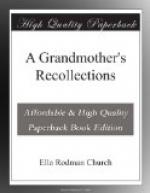Our grandmother, having spent many years in the “mother-country,” was extremely English in her feelings and opinions, and highly advocated the frugal diet on which the children of the higher classes are always kept. Lord and Lady Grantham, the son-in-law and daughter at whose residence she passed the time of her sojourn in England, were infallible models of excellence and prudence; and the children were again and again informed that their little English cousins were never allowed meat until the age of seven, and considered it a great treat to get beef broth twice a week. Butter was also a prohibited article of luxury—their usual breakfast consisting of mashed potatoes, or bread and milk; and my grandmother used to relate how one morning a little curly-headed thing approached her with an air of great mystery, and whispered: “What do you think we had for breakfast?” “Something very good, I suspect—what can it be?” “Guess.” “O, I cannot; you must tell me.” “Buttered bread!” Our laughter increased as she gave an amusing account of the blue eyes stretched to their utmost extent, as these wonderful words were pronounced hesitatingly, as though doubtful of the effect; and in consequence of various anecdotes of the same nature, the children’s impressions of England were by no means agreeable. Our little cousins must certainly have been the most wonderful children ever heard of, for by my grandmother’s account, they could dance, sing, and speak French almost as soon as they could walk. She also informed us, as a positive fact, that on saying: “Baisez, Cora—baisez la dame,” the very baby in arms put up its rosebud lips to kiss the stranger mentioned. It would have been stranger still for the younger children to speak English, as they were always in the company of French nurses.
Although my grandmother could so easily assume a stern and commanding air, it was by no means habitual to her; and the children, though they feared and never dared to dispute her authority, soon loved her with all the pure, unselfish love of childhood, which cannot be bought. “Things were not so and so when I was young,” was a favorite remark of hers; and as I one day remarked that “those must have been wonderful times when old people were young,” she smiled and said that “though not wonderful, they were times when parents and teachers were much more strict with children than they are now.” I immediately experienced a strong desire to be made acquainted with the circumstances of my grandmother’s childhood, and began hinting to that effect.
“Were they very strict with you, grandmother?” asked we mischievously.
She looked rather disconcerted for a moment, and then replied with a smile: “Not very—I saw very little of my parents, being mostly left to nurses and servants; but you all seem eager for information on that point, and although there is absolutely nothing worth relating, you may all come to my room this evening, and we will begin on the subject of my younger days.”




